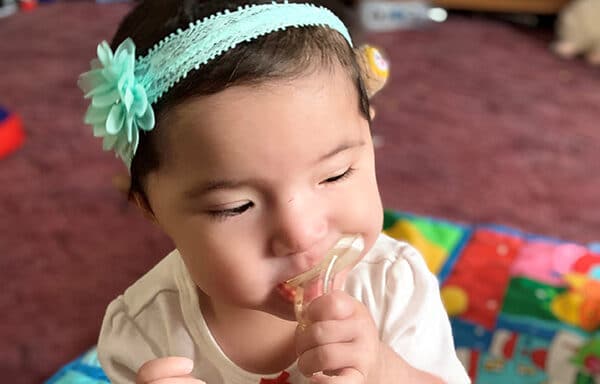Researchers at NAU join with Hopi and Crow tribes to tackle early childhood tooth decay

Early childhood caries (ECC), or tooth decay, has been linked to serious chronic health conditions like premature or low birth weight in infants, diabetes, cardiovascular diseases and stroke, according to the Arizona Healthy Smiles, Healthy Bodies Survey conducted by the Arizona Department of Health Services.
Researchers from Northern Arizona University’s Center for Community Health and Engaged Research (CHER) and other institutions are working to combat ECC among two American Indian communities through an oral health intervention called Great Beginnings for Healthy Native Smiles. This four-year study, funded by the National Institute of Dental and Craniofacial Research (NIDCR), involves a partnership with the Hopi Tribe in Arizona and the Crow Tribe in Montana, with nearly 350 mothers and their children participating in the study.
According to Julie Baldwin, Regents’ Professor in the Department of Health Sciences, the director of CHER and principal investigator of the project, the primary goal of the project is to partner with the tribal members to improve oral health knowledge, beliefs and practices and to create a program of best practices that is locally and contextually relevant to American Indian mothers within these communities.
The program includes motivational interviewing, a method used to find the internal motivation needed to change behavior, for pregnant women and new mothers so that mothers can make health-promoting decisions regarding their infants’ oral health. The program also incorporates fluoride treatments and oral healthcare for infants.
“This is such a critical public health issue for American Indian and other rural communities with little access to dental health services,” Baldwin said. “We hope that this program will make a major difference in reducing the number of caries that children develop before the age of three, which in turn, will lead to better overall health for children, families and communities.”
Co-investigators on the research team are Kristan Elwell, assistant clinical professor in the Department of Health Sciences, Steven Barger, professor in the Department of Psychological Sciences, Heather Thomas, assistant clinical professor in the Department of Dental Hygiene and Dawn Clifford, associate professor in the Department of Health Sciences, Carolyn Camplain, Christine Kirby and Katharine Sanderson, CHER senior research coordinators.
The program builds on the work of researchers and faculty members from the University of Colorado Denver, the University of New Mexico and the University of Adelaide, who are collaborating with the NAU team. CHER investigators have also partnered with the Hopi Department of Health and Human Services in Arizona, Little Big Horn College in Montana, key tribal healthcare providers, cultural experts, faculty and staff at NAU and internationally recognized Indigenous researchers in the field. The team frequently consults with community advisory boards consisting of expectant and new mothers, as well as health and service providers from each community.
Sara Young, community liaison for the Crow Tribe, helped write the original version of the grant five years ago when the team first started trying to obtain funding for this project.
Funded through a cooperative agreement from the NIDCR, 1U01DE028508 and 1R56DE026704, the program is now finishing its second year. The research team has collected data from focus groups and from interviews with health and social service providers, mothers and caregivers of young children and members of the tribal communities. The intervention has been on hold because of COVID-19, but the team hopes to start recruiting participants soon.
“The formative aspects of the study helped us to better understand the daily lives of pregnant women and new mothers in each community,” Elwell said. “Early childhood caries in young children occurs in a broader social context, and talking with community members directly is a great way to understand what is important to them.” Thomas, who has been a clinical hygienist for 13 years and is completing a doctorate in interdisciplinary health at NAU, helped to write the education portion of the oral health intervention and helped train the community health representatives (CHRs).
“The CHRs are really key in this project because they will be the ones working with all of the moms,” Thomas said. She said an important part of the project is to meet with the community advisory boards and the representatives of tribes to get cultural input to help adapt the material for each tribe.
Gerlinda Morrison, site coordinator for the project at Little Big Horn College, will be working on the Crow Reservation with pregnant and postpartum women. She said researchers will follow the mothers and their children for at least two years. During the study, participants will attend seven meetings where they will discuss topics related to prenatal and postnatal health of mothers and oral health. Children in the study will receive regular oral exams along with fluoride treatments.
“We have cultural implications regarding oral health,” Morrison said. “We try not to exclude our culture from any of our interactions with the community. We keep the community at the core of our project.” Gloria Grover, site coordinator of the Hopi program, previously worked with the Head Start programs on both the Hopi Reservation and the Navajo Nation.
“The overall goal of the project is to reduce the amount of dental caries by the time the participants turn 3 years old, as this is a concern on Hopi,” Grover said.
Stephanie Hyeoma, a health educator for the Hopi Tribe, said she also has a background in the health field and she applied for the health educator position to make a difference.
“For me, I wanted Hopi women to get information on how important it is to take care of their teeth, especially during their pregnancy, and especially their children’s teeth,” Hyeoma said.
Elyse Lomawaima, health educator with the Hopi Tribe, said she will work with about 10 women per month who are pregnant or have children from birth to 3 years old.
